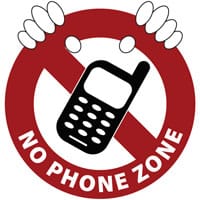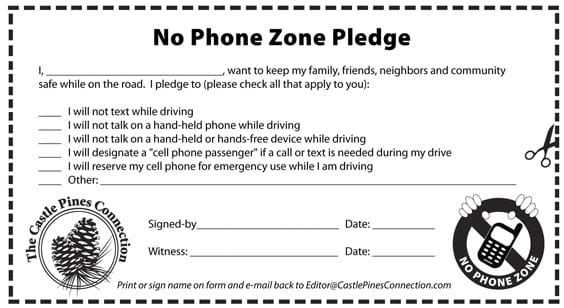Pledge to say no to cell phones while driving

by Elean Gersack
Make a pledge to hang up the phone and set a good example. It’s that simple. New drivers, and children who will be behind the wheel in the years to come, are paying attention. If mom and dad talk or text while driving, why should teens do any differently? According to the Rocky Mountain Insurance Association, motor vehicle crashes are the leading cause of death among 15 to 20 year-olds.
Distracted driving is a key factor in car accidents. According to the National Highway Traffic Safety Administration, nearly 80 percent of crashes and 65 percent of near-crashes involve some form of driver inattention within three seconds before the event. The most common distraction is cell phones. Unfortunately, hands-free phones don’t seem to decrease the crash risk. According to the Insurance Institute for Highway Safety, although hands-free devices may eliminate some physical distraction, the cognitive distraction from phone conversations remains.
With the rise in texting popularity, texting and driving has become a leading driver distraction. Edgar Snyder & Associates, a law firm representing the injured, tracks car accident statistics and has compiled some startling facts:
Almost 50% of all drivers between the ages of 18 and 24 text while driving. However, teens aren’t the only ones. Almost 30 percent of drivers in the 25 to 34 age group text while driving and 19 percent of drivers aged 35-44 do so, too.
Distracted driving leads to 4 out of 5 (80%) car accidents nationwide. In contrast, drunk drivers account for roughly 1 out of 3 accidents (33%).
In 2008 almost 6,000 people were killed and a half-million were injured in crashes related to driver distraction.
In December, Colorado House Bill 1094 was passed. The bill prohibits drivers under the age of eighteen from using wireless telephones for talking, texting or listening while driving a motor vehicle. It also prohibits drivers eighteen and older from using a wireless telephone for texting or other manual data entry or transmission while driving a motor vehicle. Violators of the bill will incur a class A traffic infraction.
The Douglas County Sheriff’s Office wants to get the word out that cell phones and driving just don’t mix. “Handling non-emergency calls before or after a drive, and obeying this new law and all other traffic laws, will make all of us safer on the road,” said Sheriff David A. Weaver.
Take the Pledge!
The Castle Pines Connection has initiated a pledge to help keep Castle Pines roads safe and we need your help. Is a call or text really worth the risk? Take the pledge to keep your car a “Phone Free Zone”. Encourage friends, family, neighbors and classmates to sign it, too. Kids can sign the pledge and help remind grown-ups to dial or text before or after a car trip. Challenge yourself and others to read and sign the pledge, too.
Click here and sign the online pledge and e-mail the form back to the editor and receive a free “Phone Free Zone” window decal for your car. Together, we can all make a difference.